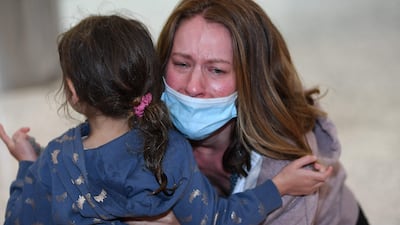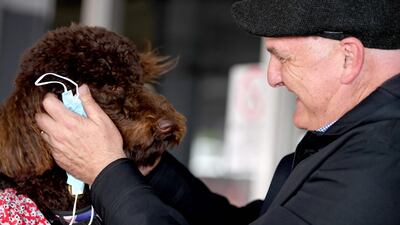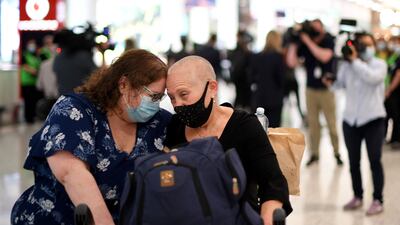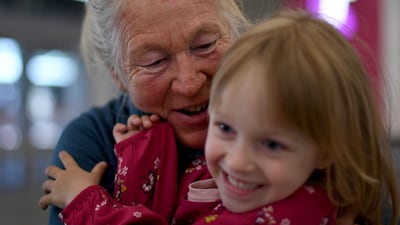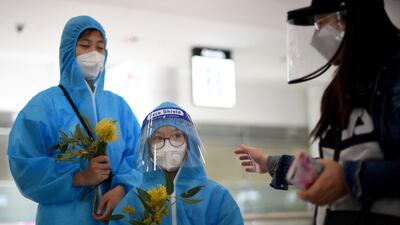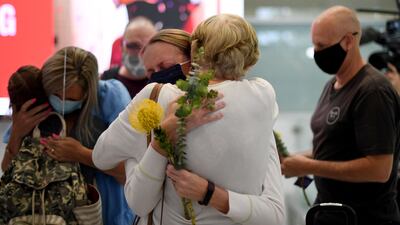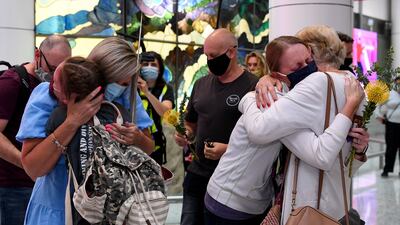Sydney’s international airport hosted happy reunions on Monday as Australia reopened its border 600 days after it was closed because of the Covid-19 pandemic.
Passengers began to arrive at Kingsford Smith International shortly after sunrise to be greeted by emotional loved ones.
On March 20 last year, Australia introduced some of the world's toughest border restrictions in response to the pandemic, with almost all travel to the country halted.
For the past 19 months, Australians have been banned from travelling overseas without permission.
Families were split across continents as tens of thousands of citizens were stranded overseas.
The few who did gain permission to enter were forced to spend thousands of dollars and agree to spend 14 days of isolation in a hotel room.
Those conditions have now been dropped for the country's two largest cities, Sydney and Melbourne, which will now allow vaccinated Australians to come and go without quarantine of any kind.

Sydney resident Anthony Baxter told The National that on Friday his parents will meet his son for the first time.
“Our son was born in May. We are in Sydney and my parents are in Melbourne. The Victorian government's enthusiasm for snap border closing meant we did not feel safe having them visit in case they could not get home. They are flying up in a few days and I am going to cry ugly happy tears,” he said.
Next week Mr Baxter’s young son will see his other grandparents in regional New South Wales, who have not had the chance to hold him since he was one week old.
As some Australians returned home, others stuck in the country took the opportunity to leave.
Abhi Bajaj, 35, said it was “too overwhelming” that he could now travel to the US to celebrate Christmas with family after two years apart.
“I was waiting for this day for a long time,” he told AFP, before boarding a flight to Los Angeles.
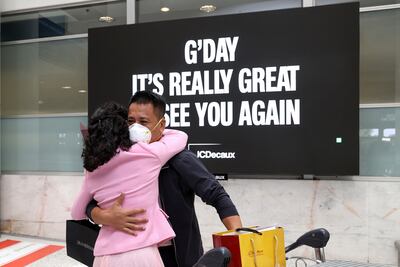
Australian airline Qantas had grounded much of its fleet for more than 18 months, with chief executive Alan Joyce calling the resumption of regular international flights “a long time coming".
“It is wonderful to see Australians able to reunite with loved ones after such a long time apart,” he said.
Prime Minister Scott Morrison said it was a “big day for Australia”, posting on Facebook that the country was now “ready for take-off!”
Travel is expected to resume slowly after such a protracted shutdown, with low passenger numbers on the first flights to arrive.
Dr Chris Moy, National Vice President of the Australia Medical Association, told The National that aside from the slow start to the vaccination roll-out, the country had handled the pandemic “reasonably well”.
“The death rate has been kept low, even from a per capita perspective — if we had the same rate as the UK we would have had 40,000 deaths. Vaccinations started late … but we have caught up and are on track for very high vaccination rates.
“The country is split in two, there are two stories — in the states where there has been Covid-19 and lockdowns, New South Wales and Victoria, the decision to come out of restrictions has been relatively straightforward, given their high vaccinations levels. Any freedom is being welcomed, given what they have had to go through. There is still some risk, but we will see how they go.
“In other states with lower vaccination levels it’s harder because they have been living ‘freedom day’ already [being free of internal Covid restrictions], it’s more like releasing the brakes slowly.
More than one million foreign residents remain stuck in Australia unable to see friends or relatives overseas, with the relaxed travel rules applying mainly to citizens.
And some Australian states with lower vaccination rates will remain virtually closed to the world as they still have mandatory and costly 14-day hotel quarantine requirements. A day before the happy reunions at Sydney airport, Western Australia tightened border controls.
Dr Duncan Smith, President of the Western Australian branch of the Australian Medical Association said the state was running behind on vaccinations and warned that the Western Australian public health system has “no reserve capacity”.
“For us if there were a Covid outbreak we would have to shut down all non-essential services. We have the lowest number of hospital beds and lowest number of ICU beds per capita in Australia.
“That would be one of the factors in the premier’s mind [state government leader Mark McGowan] and something he would be thinking about when looking at when to open up, as well as the state’s vaccination rate.”
A representative for Tourism WA told The National that the state’s international arrivals cap remains at 265 people per week, and incomers must complete 14 days of quarantine at a government-sanctioned hotel.
“Over the past 19 months, Western Australia has experienced its biggest ever intrastate tourism boom. Regional destinations have been able to welcome massive numbers of Western Australian tourists over this time — with WA’s Covid-free status ensuring small businesses, bars, restaurants, hotels and tourism operators have been able to enjoy significant economic benefits.
“Tourism WA is continuing to develop strategies and campaigns to ensure Western Australia is well positioned to capitalise on a return to international travel, when it is safe to do so”, they said.



